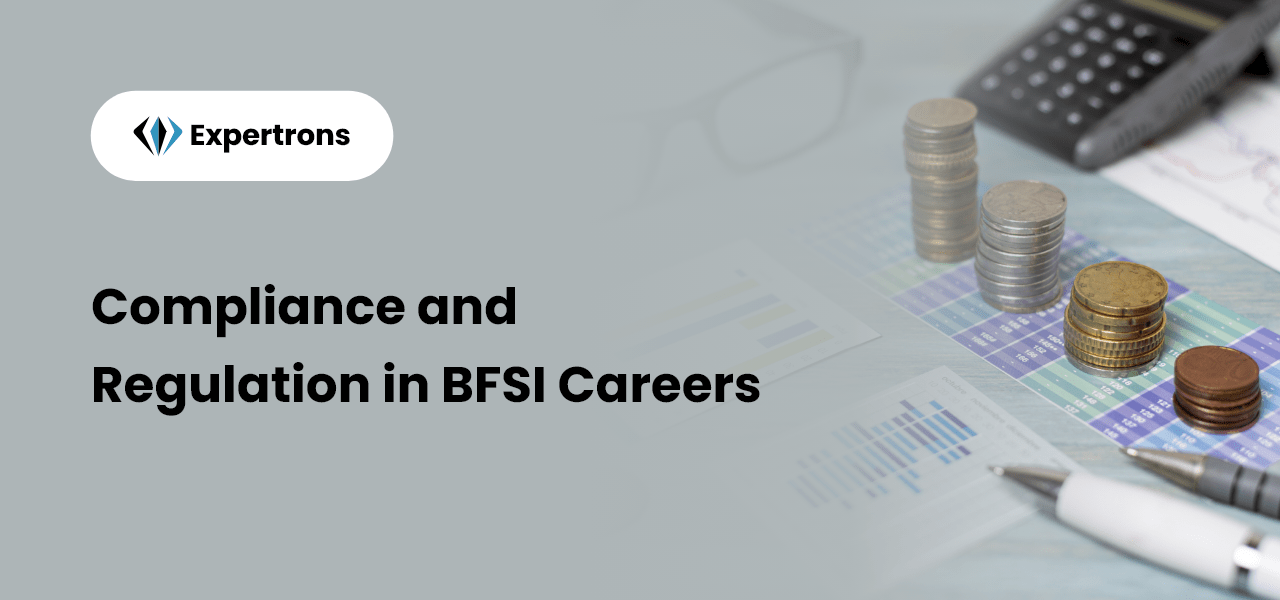Introduction
In the intricate landscape of Banking and Finance, the role of compliance cannot be overstated. The robust functioning of the industry relies on adherence to an array of regulations, guidelines, and standards.
Today let us delve into the significance of compliance in banking and finance (BFSI) and provide insights on how individuals can effectively navigate the complex world of compliance in their careers within this sector.
Compliance forms the bedrock of the BFSI sector. With the global financial crisis of 2008 still reverberating in the collective memory, regulatory bodies worldwide intensified their efforts to ensure stability and transparency.
This led to the establishment of a myriad of regulations to safeguard the financial system. The compliance framework in BFSI spans anti-money laundering (AML), know-your-customer (KYC) procedures, data privacy, risk management, and more.
Adhering to these regulations is not merely a legal obligation but also a strategic imperative for financial institutions.
The Ever-Evolving Regulatory Landscape
Navigating compliance in banking and finance requires constant vigilance due to its dynamic nature. Regulations are subject to frequent updates and amendments, often in response to emerging risks and technological advancements.
Financial professionals must stay attuned to these changes, as non-compliance can lead to hefty fines, reputational damage, and even legal repercussions.
Being well-versed in the evolving compliance landscape is essential to ensure the institution’s integrity and maintain public trust.
Read this: How to Make a Career in Banking: A Step-by-Step Guide
Compliance as a Career Path
The demand for compliance professionals in the BFSI sector has surged in recent years.
As regulatory requirements become more intricate, financial institutions seek individuals with specialized expertise to ensure compliance. A career in compliance offers a unique blend of legal, ethical, and analytical challenges.
Professionals in this field must possess a comprehensive understanding of the regulations pertinent to their banking diploma, and they play a crucial role in designing and implementing compliance programs that mitigate risks.
Navigating Compliance Challenges
- Continuous Learning: As the regulatory environment keeps evolving, compliance professionals must engage in continuous learning. Staying up-to-date with regulatory changes, market trends, and technological advancements is paramount.
- Interdisciplinary Knowledge: Compliance in BFSI demands a multidisciplinary approach. Professionals need to comprehend not only the legal aspects but also the operational and technological intricacies of the institution.
- Ethical Dilemmas: Compliance professionals often encounter ethical dilemmas while balancing regulatory requirements with business goals. The ability to navigate these challenges while upholding the institution’s integrity is crucial.
- Communication Skills: Effective communication is essential for compliance professionals to convey complex regulatory information to various stakeholders, from senior management to front-line staff.
- Collaboration: Compliance in banking and finance is a collaborative effort. Professionals must work closely with legal teams, risk management, and business units to ensure a holistic approach to compliance.
Strategies for a Successful Compliance Career
- Education and Training: Pursuing post graduate diploma in banking and finance can equip individuals with the necessary knowledge and skills.
An outstanding prospect in this field is the Intensive Post Graduate Diploma in Banking and Financial Management by Expertrons. This program presents a remarkable opportunity and comes with 100% Placement Assurance in India’s top leading financial companies.
- Networking: Connecting with peers in the industry can provide valuable insights into best practices, challenges, and opportunities. Networking also facilitates sharing of knowledge on evolving compliance trends.
- Adaptability: Given the dynamic nature of compliance, individuals must embrace adaptability. This includes being open to learning new regulations and approaches and adjusting strategies accordingly.
- Attention to Detail: Compliance is built on meticulous attention to detail. Professionals must be thorough in their work to identify potential compliance gaps and risks.
- Innovation and Technology: Embracing technological advancements can streamline compliance processes. AI and automation tools can assist in data analysis and risk assessment.
- Ethical Mindset: Upholding ethical values is at the core of compliance. Individuals must possess a strong ethical compass to make decisions that align with both regulations and the institution’s values.
Also read: How to Make a Career in Banking: A Step-by-Step Guide
Final Words
In a nutshell, compliance in banking and finance is not a mere formality; it is the cornerstone of a secure and trustworthy financial system. As the regulatory landscape continues to evolve, the demand for compliance professionals will only intensify.
By staying informed, honing their skills, and embracing an ethical approach, individuals can carve out successful metrics in the diploma banking career list when it comes to compliance in BFSI domain.
Remember, compliance is not just about meeting regulatory requirements; it’s about safeguarding the stability and integrity of the financial sector.
Frequently Asked Questions
Compliance and regulation play a pivotal role in the BFSI sector by ensuring adherence to legal frameworks, promoting transparency, and maintaining the stability and integrity of financial systems.
Compliance professionals in BFSI are tasked with interpreting complex regulations, developing and implementing compliance strategies, conducting audits, and fostering a culture of ethical conduct within financial institutions.
A thriving career in compliance and regulation within BFSI demands a deep understanding of financial laws, coupled with analytical acumen, attention to detail, legal expertise, and effective communication skills.
Compliance in banking and finance significantly shapes career trajectories in BFSI, offering pathways to specialized roles such as compliance officers, risk managers, and legal advisors. This expertise paves the way for career advancement and higher responsibilities.
Professionals can remain informed about evolving compliance regulations in BFSI by pursuing Expertrons Post Graduate Diploma in Banking and Finance and benefit from 100% Placement Assurance in India’s top financial institutions like Kotak Mahindra Bank, Union AMC, and more.











